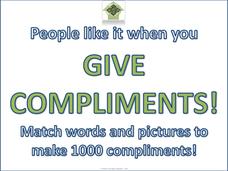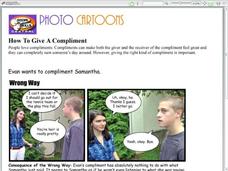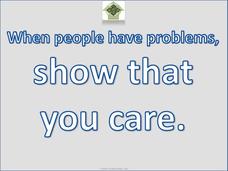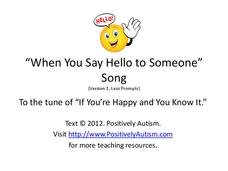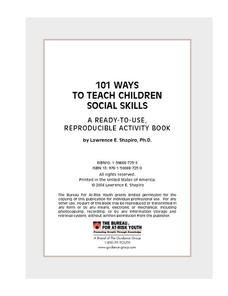Read Works
Cool to Be Kind
Make a connection between empathy and bullying with a reading passage that has readers thinking about other people's feelings. After reading, learners respond to ten reading comprehension questions involving short answer and multiple...
Bully Free Systems
Bully Free Lesson Plans—Seventh Grade
Having a hard time defining bullying with your seventh graders? Discuss the different types of behavior one would see in a bullying situation with a series of lessons, worksheets, and group activities.
PACER Center
Kids Against Bullying Classroom Activity Book
Have class members take the pledge against bullying! Use the eight-page packet during a bullying unit to reinforce the importance of sticking up for others, thinking about what might hurt others' feelings, and ways to prevent bullying.
Talking with Trees
What is Respect?
Inspire scholars to be the best they can be with a worksheet featuring the character trait, respect. Individuals read multiple scenarios, match their outcomes, and identify whether the behavior was respectful or disrespectful.
Museum of Disability
Taking Visual Impairment to School
What is the world like when you can't see, or when your vision is impaired? Learn about how Lisa communicates with the world around her with Taking Visual Impairment to School by Rita Whitman Steingold. Learners answer discussion...
Museum of Disability
Rolling Along
Kindness and empathy can be as important as reading comprehension skills, especially for younger learners. Reinforce both with a lesson based on Rolling Along: The Story of Taylor and His Wheelchair by Jamee Riggio Heelan. As...
Museum of Disability
Looking Out for Sarah
Perry the dog is Sarah's best friend and her guide to the visual world. Young readers learn about guide dogs and communication with Looking Out for Sarah by Glenna Lang, through a series of discussion questions and activities.
Museum of Disability
Can You Hear a Rainbow?
Teach your class about compassion and empathy with Jamee Riggio Heelan's Can You Hear a Rainbow? As kids read about Chris, a boy who is deaf, they discuss the things he likes to do, as well as the ways he communicates with the world.
Museum of Disability
Stand in My Shoes
Stand in My Shoes, a story by Bob Sornson, is an effective way to teach young learners about empathy and making friends. Once pupils read through the story, they answer a series of discussion questions and complete reading activities...
Museum of Disability
A Picture Book of Louis Braille
Teach kids about the beginnings of the Braille writing system with a lesson about Louis Braille. A series of discussion questions guide young readers though A Picture Book of Louis Braille by David A. Adler, and once they finish the...
Museum of Disability
Stand Tall, Molly Lou Melon
Help to create the next generation of friends with a lesson about accepting people who are different. As kids read Stand Tall, Molly Lou Melon, they answer a series of discussion questions and activities about making friends with others.
Museum of Disability
Taking Down Syndrome to School
Teach your class about the ways they can befriend and understand people who are different from them with a reading comprehension lesson. As youngsters read Taking Down Syndrome to School by Jenna Glatzer, they answer a series of...
Museum of Disability
Don't Laugh at Me
You can prevent bullying in your classroom by addressing kindness, empathy, and acceptance with your littlest learners early on. After reading Don't Laugh at Me by Steve Seskin and Allen Shamblin, kids discuss the ways that words can...
Museum of Disability
Don't Call Me Special
Introduce young learners to the idea of disabilities and making friends with children who are different than they are. Using Don't Call Me Special - A First Look at Disability by Pat Thomas, learners are guided through the new vocabulary...
August House
The Great Smelly, Slobbery, Small-Tooth Dog
Read the story The Great Smelly, Slobbery, Small-Tooth Dog: A Folktale from Great Britain by Margaret Read MacDonald and choose from multiple activities to learn about the tale's theme—kindness. With so many options, your kind kids will...
Curated OER
Give Compliments!
Learners practice the important social skill of offering appropriate compliments in a variety of situations! Pupils match photographs of particular events that call for a compliment with an appropriate compliment from a list provided in...
Social Skills Central
Photo Cartoons: How To Give A Compliment
Help learners develop the ability to offer appropriate, meaningful compliments to others—an essential social skill. Here you'll find a quick photo cartoon illustrating a right and wrong way to give a compliment, as well as a brief...
Social Skills Central
Photo Cartoons: Being Polite
Have you ever been left out of plans your friends were discussing? This photo cartoon will help your learners recognize that being polite can go beyond just saying please and thank you by making sure others feel included and welcomed.
Curated OER
Show That You Care
Learners on the autism spectrum can have difficulty expressing care or providing emotional support for others. Support them with this series of presentation slides that break down the steps to showing others you care, from appropriate...
Curated OER
Words Can Hurt; Words Can Help
Help learners on the autism spectrum comprehend the social consequences of their actions by connecting kind and hurtful words to physical, tangible experiences. The worksheets in this resource prompt students to consider things they say...
Positively Autism
"Share the Road" Folder/Shoebox Games
Introduce the importance of sharing and taking turns with your learners through a hands-on learning experience involving toy cars! Here you'll find activity instructions and printables to support your "Share the Road" collaborative...
Positively Autism
Song: Eye Contact When Greeting
When you say hello to someone, look at their eyes! Set to the tune of "When You're Happy and You Know It," this activity helps learners on the autism spectrum build a valuable social and conversational skill.
Curated OER
Missing Objects Game
Help students learn how to encourage others using kindness and supportive words with this social skills game. Designed for learners on the autism spectrum, students practice using encouragement phrase prompts while another works to...
Guidance Group
101 Ways to Teach Children Social Skills
Increasing pressure to improve student achievement has made it easy to overlook the social skills they also need to develop. With this collection of worksheets and activities, you'll be able to improve children's communication, teamwork,...

















